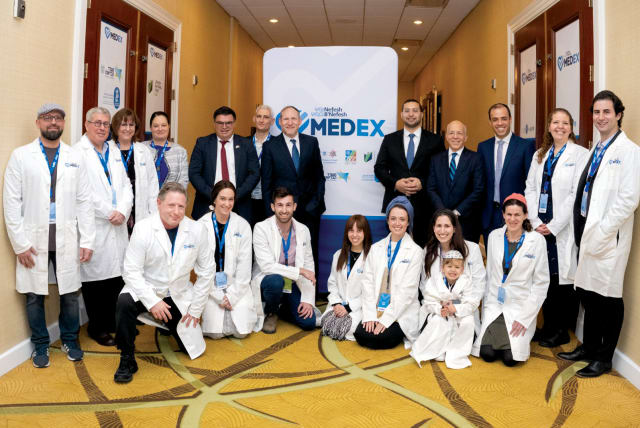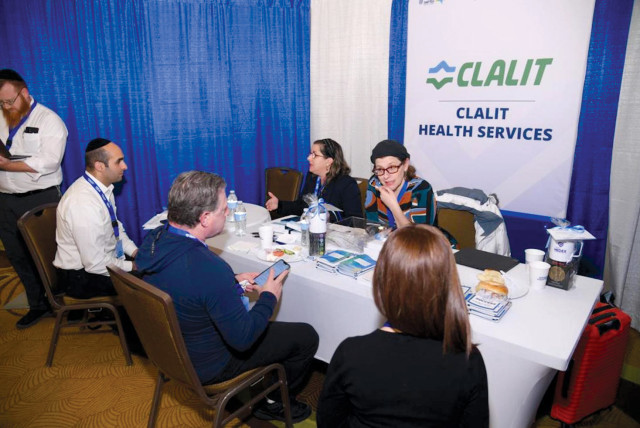Making aliyah: Can you find success, work-life balance in Israel?

At an event in New Jersey for medical professionals considering aliyah, Dr. Elissa Freedman presents a realistic take on life for women in Israel.
“There are endless opportunities in Israel,” Dr. Elissa Freedman told two earnest students who sat before her, waiting to soak up any information she had about her personal and professional life in the Jewish state.
A family physician and educator at the Medical School for International Health at Ben-Gurion University of the Negev and Clalit Health Services, Freedman made aliyah from Connecticut to Beersheba in 2016. Although it’s been a while since Freedman faced the at times daunting task of uprooting one’s life in order to make aliyah — not to mention getting through medical school — she well remembers the ups and downs. As a result, she was happy to share her knowledge while attending MedEx, an event for medical professionals considering aliyah, hosted by Nefesh B’Nefesh.
What transpired was an organic and personal conversation between Freedman and two Yeshiva University students who are seriously contemplating making aliyah.
Taliah Soleymani, a pre-medical student from Skokie, Illinois, studying neuroscience; and Yali Proctor, a pre-med student from the Five Towns in Long Island, were two of the approximately 400 medical professionals who attended the recent annual event in Teaneck, New Jersey. There, attendees received expedited processing of their paperwork and networked with Israeli medical professionals, employers, and on-site licensing officials. The event was geared toward those in the advanced stages of aliyah, as well as young professionals like these two young women. It was held in cooperation with Israel’s Ministry of Aliyah and Integration, the Jewish Agency for Israel, Keren Kayemeth LeIsrael, and Jewish National Fund-USA, alongside Israel’s Ministry of Health and the Israeli Medical Association.
If you are interested in research, Israel is the place to be, Freedman asserted when asked about opportunities in that realm. In fact, Israel publishes more research per capita than any other country in the world, she added.
“What Israel offers the world right now is big data,” Freedman said, explaining that she has a colleague at Ben-Gurion University with whom she could connect Soleymani. “We have all our health records in a unified system. So [my colleague] and his team were able to take four million visits of children who frequented Israeli well baby clinics and used that data to recalibrate developmental milestones for children that is far more evidence-based than any existing data we had.”
Freedman also spoke about her own research, which focuses on raising awareness about cervical cancer. “I’m constantly working on developing myself professionally. What you do at age 22 is not and should not be what you’re doing at 32 or 42. Otherwise, we’d be bored for 60 years,” she said.
“I’m so proud to be part of the Israeli healthcare system. When I think about the fact that Israel spends 25% of what the US spends on healthcare and yet our life expectancy is four years longer, we’re doing a great job giving everybody healthcare,” she asserted.
But while the professional opportunities are bountiful, what does life look like on a day-to-day basis?
The mother of three doesn’t paint a completely rosy picture. “Being a doctor is not easy. When I think back of long shifts, having a miscarriage while on call, and how I worked six days a week for 14-hour shifts when my child was only six months old, I know I sacrificed a lot. My family sacrificed a lot. Now it’s better, thank God, but I still have long days. But I love what I do.”
In the middle of Freedman’s talking about how she missed her children back home, she realized that it was already late in the afternoon in the US, and the window to say goodnight to them in Israel had passed.
“I’m a bad mom,” she sighed, interrupting the conversation to send a voice message to her husband. “It’s been an amazing day. I got called to be on a panel to talk about my work in the Negev. The former mayor of Yerucham, Michal Biton, recognized me on stage, and I got interviewed by [“JM in the AM” host] Nachum Segal. But I’m talking in front of two medical students focusing on how sad I am that I didn’t get to say goodnight to my kids.”
The admission may very well encapsulate what work-life balance looks like for a busy professional woman today in Israel — where navigating career perks and the demands of maintaining a home is a daily juggling act.
But when it comes to envisioning how you want your future to look, Freedman offered this advice to the two young women: Sometimes you daven [pray] for what you want, but you really should daven for you to appreciate the things that Hashem gives you.
Being a mother to a son with special needs also played a major part in her stance that Israel may be the more compassionate place to raise children. Freedman is well known in Beersheba regarding her advocacy for children with special needs.
“I had [my son] during my residency. By the time we started trying at 30, I had two miscarriages and needed to take hormones,” she revealed. “When I took the hormones, I was warned there could be birth defects. I didn’t care. I wanted this baby. And the first time I held him in my arms, I knew he would have something. But I loved him no matter what. I love this kid more than anything.
“It was awful to not have kids and know you were meant to be a mom,” she continued. “But if I had my son during my internship, I don’t know how I would have been able to cope. He came at the right time for us.”
She acknowledged also that her husband helps a lot by helping the family run smoothly.
“Do you ever wish you could have both roles?” Proctor asked, getting to the heart of the matter of whether or not “having it all” in Israel is really possible.
“Yes, I really struggle with it, actually. But this is how our life worked out. The fact that my husband is so available gives me the ability to do everything I want to do professionally. He’s made me such a better person, and I’ve helped so many people because he gave me the time to do so.”
As such, Freedman has made it her personal mission to help kids in southern Israel with special needs as an outlet that would probably not have been possible in the US.
“My son is in a regular school but in a special class, which is a reason in and of itself to make aliyah. You never know if you’ll have a child with special needs,” she said. “When we lived in Hartford and met with the principal of the local Jewish school to find a place for him, I was told to go to public school instead. I thought that was absolutely not an acceptable answer. A child from an Orthodox family in the US belongs in a Jewish school. I felt that the community slammed the door in my face.”
Rather than pay the annual $60,000 tuition to attend a private Jewish school in New Jersey that could meet their son’s needs, Freedman and her husband took that rejection as a final sign that Israel was really where they needed to be.
“Yes, there was a fight in Israel. I’m a thorn in the side of the special education system in Beersheba,” she joked. “But a few other families and I managed to open classes for kids with special needs, and it worked because we pushed the envelope as a community. We love living there.”
Should these two students decide to move to Israel, their presence will be welcomed, as Israel is inching its way toward a doctor shortage in the near future.
“For 30 to 40 years we had American students coming to Israel to study medicine with the explicit understanding that they’d go back to the US. Back then, we didn’t have the shortage of doctors that we do now. In fact, with Russian immigration in the 1990s, we had plenty of doctors. Now it has been determined that we have a shortage, and the Council for Higher Education ended the international medical school programs in Israel. The idea that Americans were taking up positions that otherwise would go to Israeli doctors,” Freedman explained.
Now with those Russian doctors approaching retirement and Israel nullifying medical degrees from many medical schools abroad whose standards were determined to be sub par, Israel is facing a crisis that it needs to resolve quickly.
The crisis is amplified in Israel’s periphery, where 63% of medical professionals have obtained their degree from countries that will no longer be recognized. In the Negev, for example, 51% of medical professional degrees will no longer be recognized in three years due to the new restrictions.
Nefesh B’Nefesh is working closely with the Israeli government to provide incentives for prospective immigrants who want to live in Israel’s North and South.
“The goal to increase the number of medical personnel, specifically in the Negev and Galilee regions, is modern-day Zionism at work and will provide the shot in the arm the medical establishment in these communities need,” said Negev, Galilee and National Resilience Minister Yitzhak Wasserlauf. “This initiative also helps promote the quality of life and resilience in the periphery, and that is one of my office’s core issues. As such, we hope to provide opportunities for immigrants to be absorbed into strong communities that offer a myriad of employment options upon making aliyah.”
So, can women really have it all in Israel? The answer may vary from woman to woman, but Freedman is appreciative of the life she’s created for herself.
“Maybe it’s better in Israel,” she conceded. “I wouldn’t be talking about the downsides of my life so openly in front of an American reporter and American med students. Everyone there is more understanding that life just happens sometimes.” ■
Jerusalem Post Store
`; document.getElementById("linkPremium").innerHTML = cont; var divWithLink = document.getElementById("premium-link"); if (divWithLink !== null && divWithLink !== 'undefined') { divWithLink.style.border = "solid 1px #cb0f3e"; divWithLink.style.textAlign = "center"; divWithLink.style.marginBottom = "15px"; divWithLink.style.marginTop = "15px"; divWithLink.style.width = "100%"; divWithLink.style.backgroundColor = "#122952"; divWithLink.style.color = "#ffffff"; divWithLink.style.lineHeight = "1.5"; } } (function (v, i) { });

